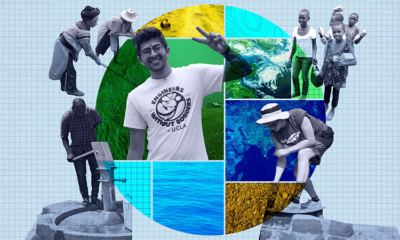Education
Travel Ban Disrupts Dreams of International Students Heading to U.S.

International students face significant barriers to pursuing their education in the United States due to the travel ban imposed by the Trump administration. The ban affects citizens from 19 countries, leading to a considerable slowdown in visa approvals and a growing sense of uncertainty among prospective students.
Saghari, a 21-year-old student, dedicated years to practicing English in hopes of studying business administration at a private liberal arts college in Illinois. She planned to begin her studies this fall but saw those dreams dashed by the travel ban. “You think that finally you are going to your dream, and then something came up and like, everything’s just gone,” she shared. Her experience is not isolated; thousands of students from the affected nations feel similarly stranded after investing time and money to come to the U.S.
The travel ban has created a logjam in visa processing, significantly impacting students eager to begin their academic journeys. According to official data, the U.S. State Department issued over 5,700 F-1 and J-1 visas to citizens from the affected countries between May and September last year. More than half of these visas were granted to citizens of Iran and Myanmar. Yet, many students who had received offers of admission are not appearing on American campuses this fall due to these increased restrictions.
Pouya Karami, a 17-year-old from Shiraz, Iran, focused exclusively on U.S. institutions for his college search, drawn by unparalleled research opportunities in science. He intended to study polymer chemistry at Pittsburg State University in Kansas but deferred his admission for the next year due to the travel ban. Karami is actively preparing for his embassy interview and advocating for a reconsideration of the travel restrictions. “I’m doing everything I can about it,” he stated.
The full travel ban encompasses citizens from 12 countries across Africa, Asia, the Middle East, and the Caribbean. Most individuals from these nations face significant hurdles in obtaining new visas, although certain exceptions exist, such as for green card holders and dual citizens. The Trump administration has maintained the ban, citing national security concerns and high visa overstay rates as justification.
The impact of the travel ban extends beyond the students themselves; entire families are affected. In Myanmar, Gu Gu, an 18-year-old student, has seen his family prioritise his education at great personal cost. His acceptance to the University of South Florida was met with overwhelming joy in his family group chat. However, his plans were abruptly halted when he learned of the travel ban. Gu Gu expressed disappointment over losing the opportunity to experience freedoms in the U.S., such as attending school without restrictions. “I was all in for U.S., so this kind of breaks my heart,” he lamented.
As many students scramble to find alternatives, Saghari’s situation reflects the broader struggle. After postponing her visa interview in Pakistan, she ultimately canceled it. She requested a deferment from Knox College, which was denied, prompting her to explore educational opportunities in Europe. However, she faced challenges with admissions processes, such as requiring a new English proficiency test, which proved difficult amid Afghanistan’s unstable political climate. She has since applied to a Polish university, contingent upon her paying tuition upfront and validating her high school degree.
The travel ban has also impacted those already in academia. An Iranian researcher, who wished to remain anonymous for fear of repercussions, was unable to take a position as a visiting scholar at the University of Pennsylvania. Now working in Tehran, he reflects on the lost opportunity, stating that he feels he is “looking at a shot in the dark” for future research opportunities. Though he is considering offers in Europe, he remains hopeful about a change in U.S. foreign policy that might allow him to pursue his academic aspirations there.
The ripple effects of the travel ban extend far beyond individual aspirations, affecting families and communities worldwide. The dreams of countless students hang in the balance as they navigate an increasingly complex and restrictive immigration landscape.
As the academic year progresses, many students remain hopeful and continue to seek paths to their educational goals, despite the obstacles they face. The struggle for access to education in the U.S. remains a pressing issue, one that underscores the importance of dialogue around immigration and international collaboration in higher education.
-

 Technology5 months ago
Technology5 months agoDiscover the Top 10 Calorie Counting Apps of 2025
-

 Health3 months ago
Health3 months agoBella Hadid Shares Health Update After Treatment for Lyme Disease
-

 Health3 months ago
Health3 months agoErin Bates Shares Recovery Update Following Sepsis Complications
-

 Technology4 months ago
Technology4 months agoDiscover How to Reverse Image Search Using ChatGPT Effortlessly
-

 Technology1 month ago
Technology1 month agoDiscover 2025’s Top GPUs for Exceptional 4K Gaming Performance
-

 Technology3 months ago
Technology3 months agoElectric Moto Influencer Surronster Arrested in Tijuana
-

 Technology5 months ago
Technology5 months agoMeta Initiates $60B AI Data Center Expansion, Starting in Ohio
-

 Technology5 months ago
Technology5 months agoRecovering a Suspended TikTok Account: A Step-by-Step Guide
-

 Health5 months ago
Health5 months agoTested: Rab Firewall Mountain Jacket Survives Harsh Conditions
-

 Lifestyle5 months ago
Lifestyle5 months agoBelton Family Reunites After Daughter Survives Hill Country Floods
-

 Health3 months ago
Health3 months agoAnalysts Project Stronger Growth for Apple’s iPhone 17 Lineup
-

 Technology4 months ago
Technology4 months agoHarmonic Launches AI Chatbot App to Transform Mathematical Reasoning





















